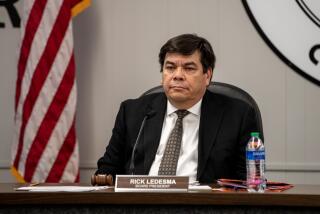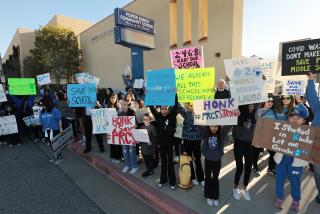Chapman University agrees to buy historic Orange schoolhouse for $3.7 million
- Share via
Chapman University has reached an agreement with the Orange Unified School District to pay $3.7 million for the former Lydia D. Killefer School, which voluntarily desegregated in 1944, three years before the landmark Méndez vs. Westminster decision forced Orange County schools to integrate.
The Orange Unified Board of Education approved the deal at its Jan. 16 meeting, amid a mixed response from residents who were pleased to hear university officials’ plan to restore the building but were also concerned that the acquisition will expand Chapman’s footprint.
The Spanish Colonial Revival schoolhouse built in 1931 represents a painful chapter in California history when Latino and white students were not allowed to attend the same schools. A group of Latino families fought school segregation in the Méndez case, which was later used by Thurgood Marshall in arguing Brown vs. Board of Education.
“The Killefer School is incredibly important to the history of Orange and of California,” Chapman University President Daniele Struppa said in a statement. “We look forward to bringing it back to life in a way that celebrates its history while creating an innovative new home for a Chapman department.”
Chapman hasn’t decided what academic department would move into the schoolhouse, Jack Raubolt, Chapman vice president of community relations, told the school board.
The school district declared the 1.7-acre parcel surplus property in 2014 and held a public auction that attracted bids from Chapman and four housing developers who wanted to build apartments on the property. Various housing projects were essentially blocked after the property was listed on the National Register of Historic Places in April 2014 through the efforts of the Old Towne Preservation Assn.
Orange resident Jerome Ryan is among a group of neighbors who have rallied to keep the historic building under public stewardship. Although he prefers Chapman as a potential buyer over a housing developer, Ryan is concerned about whether university officials will guarantee public access to the civil rights landmark.
He argues that the school board should pause the property’s sale, notify the public of its historic significance and initiate a public comment period for a new auction.
“The way the sale is going is unethical, and I’m kind of shocked that Chapman is continuing,” Ryan said.
Ryan points to the lack of public access to the Chapman-owned Cypress Street Schoolhouse, which was also voluntarily desegregated around the same time as Killefer.
Chapman installed a plaque commemorating the building’s history and a bookcase with alumni memorabilia, and the university invites the Orange Barrio Historical Society to hold board meetings at the restored schoolhouse. But the majority of the building serves as an office for Chapman’s Early Human and Lifespan Development Program and isn’t open to the public.
Adam Duberstein, co-founder of the neighborhood group Respect Orange, said he knows Chapman will properly restore the historic structure if it acquires the property.
But, he said, “Respect Orange does have concerns about Chapman’s public comments about putting an education college on the property, which further expands the footprint of the University and could create negative vehicular and pedestrian impacts to the Barrio and Historic Districts.”
Last year, Chapman revived a scaled-down version of a plan to increase student enrollment, asking city officials to approve adding nearly 1,500 full-time students over the next decade. It’s unclear how the university’s purchase of the Killefer School building will affect the environmental impact analysis required to pursue such expansion.
Langhorne writes for Times Community News.
More to Read
Sign up for Essential California
The most important California stories and recommendations in your inbox every morning.
You may occasionally receive promotional content from the Los Angeles Times.











